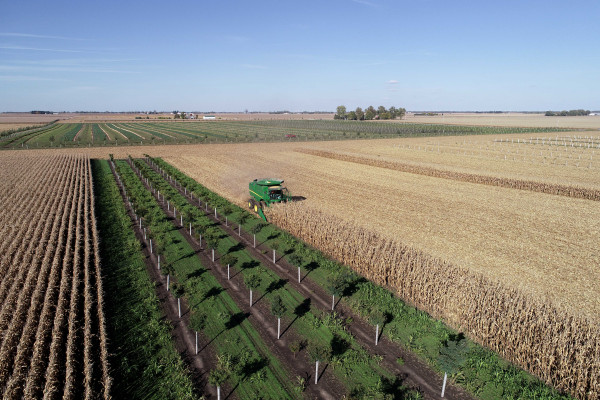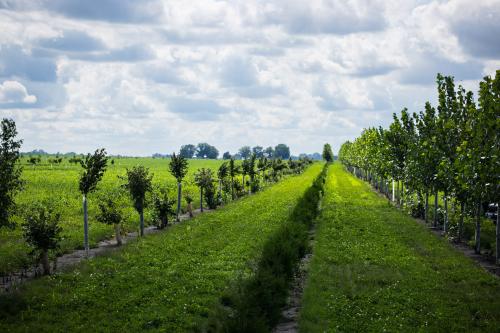Looking into the Future of Agriculture

Sitting off a rural road in East Urbana, you’ll see a sign for the Savanna Institute in what appears to be more acres of the agricultural landscape that we’re used to seeing outside of the urban center of Champaign-Urbana.
Look a little closer, and you’ll discover the land is part of the Midwest’s largest agroforestry demonstration site, which started in 2022. On this 120-acre farm, the Savanna Institute, in collaboration with numerous partners, is stacking agricultural industries to work towards conservation and sustainability through a practice called alley cropping.
In the heart of the Corn Belt, this non-profit is planting trees such as oak, hickory, persimmons, and black locusts, amongst rows of conventional grains such as corn and soy. With the technology behind precision ag, the addition of the trees among the crops isn’t a hindrance; in fact, they're a benefit. Demonstration Farm Network Director, Kaitie Adams, explains that these practices are very common in Europe and other countries around the world, but as the U.S. has a larger land area, we haven’t needed to stack crops.
 While the demonstration farm is only three years old, you can’t yet see the trees peeking out amongst the height of the corn, but it won’t take long until you start to see the benefits.
While the demonstration farm is only three years old, you can’t yet see the trees peeking out amongst the height of the corn, but it won’t take long until you start to see the benefits.
Two additional plots can be found on the farm using perennial cropping systems. In one plot, you’ll discover Elderberry and Black Currants planted alongside Japanese Walnuts (also known as heartnuts). Fun fact: the Black Currants are used locally by Cloud Mountain Kombucha and Berries & Flour.
On the final plot, amongst rows of native prairie, you’ll find Hazelnut trees, which once covered Champaign County prior to settlers arriving in the area who drained what was then swampland. This is called conservation alley cropping.
 Each of the plots is designed to find how the land in Illinois and the Midwest can be used for more sustainable farming practices.
Each of the plots is designed to find how the land in Illinois and the Midwest can be used for more sustainable farming practices.
The benefits of agroforestry are numerous, Kaitie explains. The addition of trees allows for reforestation of the land, which improves water quality, allows for carbon sequestration, provides a yield benefit, and reduces dust in high winds across the prairie. With the conservation alley cropping, you’ll see benefits for creating pollinator habitats.
The Savanna Institute and its collaborative partners are committed to bringing their research to the region. The land is leased for 50 years, allowing them time to establish clear pathways forward and innovate over time as the landscape and needs change.
Next week, just down the road in Decatur, you’ll find the Savanna Institute at the Partners for Conservation Tent at the Farm Progress Show which brings together farmers and agribusiness to see new products and practices to move agriculture forward around the world.
Yet, they also want the people who live in the area, who are interested in agriculture, and want to learn about how agroforestry can lead to conservation in the industry, to get to know them. Events on the farm will be a regular part of this outreach, and the next opportunity is coming up!
Enjoy their Twilight Tailgate with the Trees: End of Summer Celebration on Thursday, August 28, from 6:00–8:00 p.m. Drinks and snacks made from the Black Currants and Elderflower on the farm will be available, as well as family-friendly activities. From 7:00-7:30, a walking tour of the farm will be led by Canopy Farm Management, one of the partners of the Savanna Institute.
Other upcoming opportunities include their monthly Let’s Get Nuts! Tour on Saturday, September 6 from 10:00 a.m.–noon at the farm or at their sister property at the 4-H Memorial Camp Farm at Allerton Park & Retreat Center in Monticello; and Trees for Bucks, Birds, & Bees also at Allerton Park & Retreat Center on September 30 from 8:00 a.m.–4:00 p.m.
Whether you visit the farm during one of their events or your curiosity is piqued when you notice rows of trees between grain crops, learning about agroforestry means learning about the legacy of the land that once was in Champaign County. Savanna Institute looks to honor that history and be a leader in bringing together conservation and traditional agriculture.
Learn more at https://www.savannainstitute.org/.

